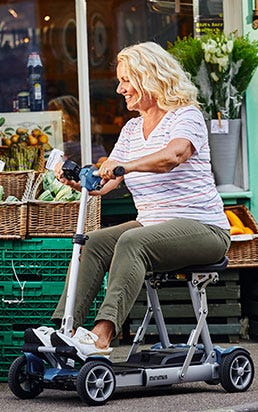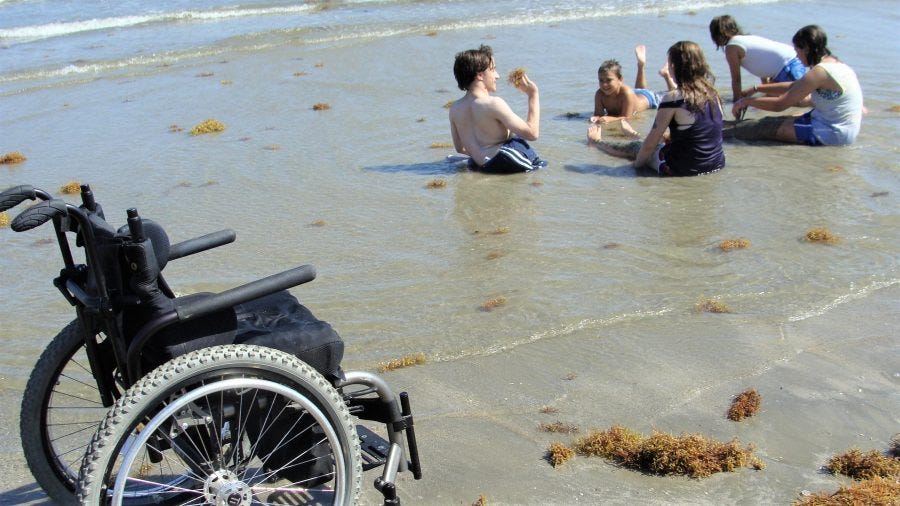Suffering from mobility problems shouldn't prevent you from living a full and happy life, no matter what your ailments are. Taking holidays, whether home or abroad, should be a part of an exciting life, helping you to escape and relax from everyday stresses and strains. However, you may feel that vacations are too exhausting to plan, especially if you use a wheelchair on a regular basis. What will happen to your wheelchair at the airport? Will my hotel room be able to accommodate my chair? To answer these questions (and more) we've done some research into what you can do to prepare yourself beforehand to ensure your holiday is worry-free!
Location, Location, Location
Research is key when it comes to finding the best location and hotel for the duration of your stay. While able-bodied holidaymakers look into the the facilities available, people with mobility problems will be more concerned with accessibility. What can you do to ensure you won't encounter any unwelcome surprises when you arrive?
- Conduct thorough research into the area surrounding your chosen hotel. For example, while the price may be low, the hills and inclines around the resort may be high, so why not look into a hotel elsewhere? Tackling steep hills when you're not used to inclines can cause strain and injury to yourself (if using a self-propelled wheelchair) or to your attendant (if using a travel or transit chair). If possible, choose a destination with similar conditions to what you're used to.
- Alongside researching into your room's facilities, contact the hotel directly to gather more information about accessibility. While many hotels will have wheelchair-friendly options, you'll need to ensure that the doorways and spaces within the room are wide enough for you to use your chair. Also, ensure you'll be given a room on the lowest/ground floor in case of an emergency (as lifts are normally switched off during the event of a fire/alarms sounding).
- Does your bathroom come equipped with a roll-in shower/shower chair to enable easy cleaning? While you may have one fitted in your own bathroom, hotels may not. If not, and if you use a manual wheelchair (do not use electric chairs in the bathroom), bring bin bags with you to cover the seat/cushion and backrest so you can use your chair in the shower.
Travelling By Aeroplane or Cruise Liner
Travelling by aeroplane cruise liner can be a daunting and worrisome experience, especially when you need to consider your own mobility problems. But there are things you can do yourself to erase the anxiety to fully enjoy your journey.
- Much like choosing a hotel, research into the different airlines/cruise companies you can fly/sail with and read reviews left by other users, particularly those written by fellow disabled people. Reviews will give you an honest and unique idea into how a company works and how they treat their passengers.
- Does your chosen airline have their own lifting policy (will the staff be able to lift you into/out of your seat?). Many airlines will allow you to use your own wheelchair up until the moment you enter the plane, when you'll be transferred into an aisle chair and then lifted into your aeroplane seat. However, this policy is not the same for all companies so check before booking your ticket.
- When flying, try to pick a window seat with extra legroom. This will ensure you won't be disrupted by fellow passengers wanting to use the toilet, and the extra legroom will make transferring you to and from your seat a lot easier.
- Let your airline/cruise company know that you use a wheelchair when you arrive at the airport. This will give them enough time to arrange when you board the plane/liner (either before/after the other passengers have boarded).
- Ensure you purchase travel insurance to protect you from any personal injuries/loss of luggage/illness whilst abroad.
Travelling By Car
If you use a wheelchair on a regular basis AND you drive then you'll be used to the transit process of folding your chair and placing it in the car. If not, then just ensure before setting off that your wheelchair fits in the boot of the vehicle, giving you enough surrounding space to be able to lift it back out again when you arrive.
General Tips
- Service your wheelchair at least two weeks before departing. Take a puncture kit with you in case of emergency.
- If you use a battery-operated wheelchair make sure you let your airline know in good time. Some companies will refuse to take certain types of battery so you'll need to make sure yours in one of their 'safe' models.
- Ask about the transfer process. If you need to pack your wheelchair away for it to be stored in the hold the airline will need to provide you with an alternative. Let them know that you use a wheelchair so they can prepare for your arrival.
CareCo's Travel Wheelchairs
Below are three of our top choices when it comes to portable wheelchairs.
- CareCo Fold and Go with Carry Bag: This incredibly lightweight folding travel chair is ideal for taking with you on vacation, especially when you consider it comes complete with a FREE carry bag! Product weight: 1.3st/8.5kg. Maximum user weight: 18st/115kg.
- Lynx 4 Aluminium Wheelchair: The Lynx 4's folded width is only 24cm (9in), and a a lap belt is included for more vulnerable users Product weight: 1.13st/12.3kg. Maximum user weight: 17.5st/110kg.
- CareCo Aluminium AirGlide SP Wheelchair: With 24" self-propelled wheels and a width-adjustable padded seat, the CareCo AirGlide is ideal for a wide range of users. Product weight: 2.1st/13.8kg. Maximum user weight: 17.3st/110kg.
View our whole wheelchair collection and watch our wheelchair reviews. read our blog post Can I Take My Mobility Scooter On A Plane? for more advice on flying with your scooter.


 Price Match Promise
Price Match Promise
 Next day delivery, 7 days a week
Next day delivery, 7 days a week
 Nationwide Showrooms
Nationwide Showrooms
 Rated Excellent
Rated Excellent







